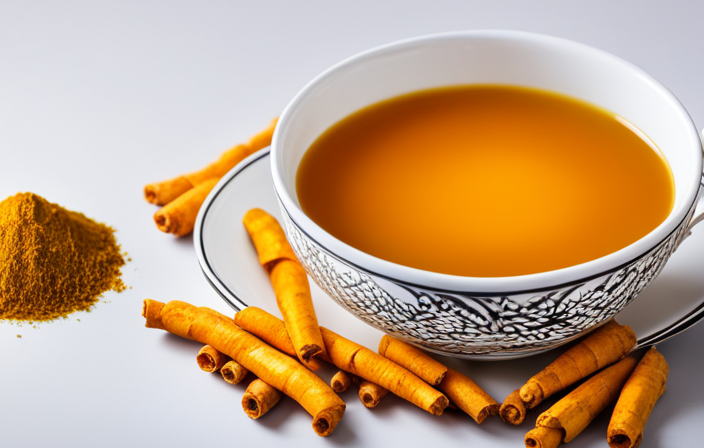Hello! Were you aware that turmeric tea is more than just a delicious drink; it’s also a potent health tonic? In this piece, I will be exploring the secrets of this radiant spice and revealing the top 10 facts about turmeric tea that might surprise you.
Get ready to be amazed by its ancient origins, incredible health benefits, and its potential to fight inflammation, boost mood, and support digestive health.
So sit back, relax, and let’s dive into the world of turmeric tea together!
Key Takeaways
- Turmeric tea has deep cultural significance and is considered a sacred spice.
- Turmeric tea offers numerous health benefits, including aiding in weight loss, improving skin health, boosting immunity, and promoting heart health.
- Turmeric tea has anti-inflammatory properties and can alleviate symptoms of arthritis.
- When brewing turmeric tea, using fresh turmeric root, adding black pepper for enhanced absorption, and simmering the tea for 10-15 minutes are recommended techniques.
The Ancient Origins of Turmeric Tea
I love learning about the ancient origins of turmeric tea and how it has been enjoyed for centuries.
Turmeric, a vibrant yellow spice, has been an integral part of ancient rituals and cultural practices in many civilizations around the world. It was first used in India, where it’s considered sacred and has deep cultural significance. Turmeric tea was believed to have healing properties and was used in Ayurvedic medicine to treat various ailments.
In Chinese and Ayurvedic traditions, it was also used as a digestive aid and to support overall well-being. This rich history and cultural significance surrounding turmeric tea make it more than just a beverage – it’s a symbol of tradition, health, and wellness.
Now, let’s explore the health benefits of turmeric tea.
The Health Benefits of Turmeric Tea
Turmeric tea is known for its numerous health benefits, such as reducing inflammation and boosting the immune system. But did you know that it can also aid in weight loss and improve skin health? Let’s dive deeper into these two fascinating aspects of turmeric tea.
When it comes to weight loss, turmeric tea can be a helpful addition to your routine. The active compound in turmeric, called curcumin, has been shown to have anti-obesity effects. It can help reduce fat tissue growth and increase fat burning in the body. Additionally, turmeric tea can help regulate blood sugar levels, which is crucial for maintaining a healthy weight.
When it comes to skin health, turmeric tea can work wonders. Its anti-inflammatory properties can help reduce redness, swelling, and acne. It also has antioxidant properties that can protect the skin from damage caused by free radicals. Drinking turmeric tea regularly can promote a healthy complexion and a youthful glow.
Let’s take a closer look at the benefits of turmeric tea for weight loss and skin health:
| Weight Loss | Skin Health |
|---|---|
| Aids in fat burning | Reduces inflammation |
| Helps regulate blood sugar levels | Improves acne |
| Supports a healthy weight | Protects against free radicals |
| Promotes metabolism | Enhances complexion |
| Helps reduce cravings | Diminishes redness |
As you can see, turmeric tea offers more than just its distinctive flavor. It can be a valuable ally in your weight loss journey and a secret weapon for maintaining healthy skin. Incorporating turmeric tea into your daily routine may be a simple and effective way to boost your overall well-being. So why not give it a try and experience the benefits for yourself? Cheers to good health!
Turmeric Tea and Its Anti-Inflammatory Properties
I’ve always been intrigued by the benefits of turmeric tea, especially its anti-inflammatory properties.
Studies have shown that curcumin, the active compound in turmeric, can help reduce inflammation in the body.
Incorporating turmeric tea into my daily routine may not only provide a warm and soothing beverage, but also support my overall health and well-being.
Health Benefits of Turmeric Tea
Drinking turmeric tea regularly can greatly improve overall wellness due to its powerful anti-inflammatory properties. But did you know that turmeric tea has numerous other health benefits as well? Let’s explore some of them in the table below:
| Health Benefit | Description | Evidence |
|---|---|---|
| Boosts Immunity | Turmeric contains curcumin, which has antimicrobial and antioxidant properties. | A study published in the Journal of Clinical Immunology found that curcumin enhances immune response. |
| Supports Digestion | Turmeric stimulates the production of bile, aiding in the digestion of fats. | A study conducted by the University of Maryland Medical Center showed that turmeric can help with indigestion. |
| Promotes Heart Health | Curcumin in turmeric helps reduce LDL cholesterol and triglyceride levels, preventing heart disease. | A review published in the journal Nutrition found that curcumin improves cardiovascular health. |
| Enhances Brain Function | Curcumin has neuroprotective properties that may prevent cognitive decline. | A study published in the Journal of Psychopharmacology showed that curcumin improves memory and attention span. |
| Supports Weight Loss | Turmeric tea can help boost metabolism and suppress appetite, aiding in weight management. | A study published in the European Journal of Nutrition found that curcumin can help reduce body weight. |
Anti-Inflammatory Effects of Turmeric
After researching, I discovered that incorporating turmeric tea into my daily routine has significantly reduced inflammation in my body. Turmeric, a golden spice known for its anti-inflammatory properties, has been used for centuries in traditional medicine. Studies have shown that curcumin, the active compound in turmeric, can help alleviate symptoms of arthritis, a condition characterized by joint inflammation. By including turmeric tea in my diet, I’ve experienced a noticeable decrease in joint pain and swelling.
To make the perfect cup of turmeric tea, start by boiling water and adding a teaspoon of turmeric powder or grated fresh turmeric root. Allow it to simmer for 10 minutes, then strain and add a squeeze of lemon juice and a drizzle of honey for taste.
Transitioning into the next section, let’s explore some delightful turmeric tea recipes to add variety to your daily routine.
How to Make the Perfect Cup of Turmeric Tea
To make the perfect cup of turmeric tea, start by bringing water to a boil and then letting it cool slightly.
Next, add a teaspoon of ground turmeric to a cup and pour the hot water over it.
Let it steep for about 10 minutes, then strain and enjoy the warm, aromatic goodness.
Brewing Temperature and Time
When should I steep my turmeric tea to get the best flavor and health benefits? Here are some brewing techniques and the optimal steeping time to ensure a perfect cup every time:
-
Temperature: Heat water to 180-200°F (82-93°C) to extract the maximum flavor and beneficial compounds from turmeric.
-
Steeping Time: Let the tea steep for 10-15 minutes to allow the turmeric to infuse into the water fully.
-
Cover the Cup: Covering the cup while steeping helps retain the heat and preserves the volatile compounds in turmeric.
-
Straining: After steeping, strain the tea to remove any sediment and enjoy a smooth and flavorful beverage.
By following these brewing techniques and steeping the tea at the optimal time, you can enhance the taste and maximize the health benefits of turmeric.
Now, let’s move on to the next topic: finding the best turmeric-to-water ratio.
Best Turmeric-To-Water Ratio
I’ve found that the best turmeric-to-water ratio for making the perfect cup of turmeric tea is one teaspoon of turmeric powder to one cup of water. This ratio ensures a balanced flavor and allows the beneficial compounds in turmeric to be effectively extracted. Turmeric tea, also known as golden milk, has gained popularity in recent years due to its numerous health benefits. From reducing inflammation to boosting immune function, this vibrant spice has a lot to offer. To fully reap the benefits, it’s important to brew turmeric tea properly. Here’s a table summarizing the key brewing techniques and health benefits:
| Brewing Techniques | Health Benefits |
|---|---|
| Use fresh turmeric root for a stronger flavor | Anti-inflammatory properties |
| Add a pinch of black pepper to enhance turmeric absorption | Boosts immune system |
| Simmer the tea for 10-15 minutes to release the flavors | Improves digestion |
| Add a dash of honey or maple syrup for sweetness | Supports brain health |
| Enjoy the tea warm for a comforting experience | Promotes heart health |
Enhancing Flavor With Additives
Using a pinch of cinnamon in my turmeric tea enhances the flavor and adds a warm, comforting note.
If you’re looking to elevate the taste of your turmeric tea, consider trying these flavorful additives and taste enhancers:
-
Ginger: Adding a slice of fresh ginger not only enhances the flavor but also provides additional health benefits, such as reducing inflammation and aiding digestion.
-
Honey: A drizzle of honey adds a touch of sweetness to balance out the earthy taste of turmeric, while also providing antibacterial and antioxidant properties.
-
Black pepper: The piperine compound in black pepper enhances the absorption of curcumin, the active ingredient in turmeric, maximizing its health benefits.
-
Cardamom: This aromatic spice adds a subtle sweetness and a hint of warmth to your turmeric tea, creating a delightful flavor combination.
By incorporating these flavorful additives, you can truly elevate the taste of your turmeric tea and enjoy a more gratifying experience.
Now, let’s dive into the role of turmeric tea in ayurvedic medicine.
Turmeric Tea and Its Role in Ayurvedic Medicine
Turmeric tea plays a vital role in Ayurvedic medicine by promoting digestion and reducing inflammation. This traditional remedy has been used for centuries to support overall health and well-being. Ayurvedic medicine, an ancient holistic healing system, recognizes turmeric as a powerful herb with numerous therapeutic properties.
Here are 10 things you may not know about turmeric tea:
| Turmeric Tea | Ayurvedic Benefits | Other Health Benefits |
|---|---|---|
| Reduces inflammation | Supports healthy digestion | Boosts immune system |
| Contains curcumin, a potent antioxidant | Balances doshas (energies) | Improves skin health |
| Helps manage weight | Promotes detoxification | Enhances brain function |
| Fights free radicals | Supports liver health | Reduces joint pain |
Turmeric tea is a versatile and delicious way to incorporate this golden spice into your daily routine. Whether you enjoy it hot or cold, its healing properties make it a valuable addition to any wellness regimen. So, sip on some turmeric tea and let its natural goodness nourish your body and soul.
The Science Behind the Golden Color of Turmeric Tea
The vibrant golden color of turmeric tea is a result of the presence of curcumin, a natural pigment found in the turmeric root. Curcumin is a powerful antioxidant and anti-inflammatory compound that has been studied for its potential health benefits. Here are four key things to know about the chemical composition of turmeric tea and its role in traditional medicine:
-
Curcumin‘s bioavailability: Curcumin is known for its poor bioavailability, meaning it isn’t easily absorbed by the body. However, consuming turmeric tea with black pepper or fat can enhance its absorption.
-
Anti-inflammatory properties: Curcumin has been found to inhibit the activity of inflammatory enzymes and reduce the production of inflammatory molecules, making it a promising natural remedy for conditions like arthritis.
-
Antioxidant effects: Curcumin exhibits potent antioxidant effects, which help protect the body against oxidative stress and damage caused by free radicals.
-
Traditional uses: In traditional medicine, turmeric tea has been used for centuries to treat various ailments, including digestive disorders, skin conditions, and even as a natural pain reliever.
Understanding the chemical composition and traditional role of turmeric tea can help us appreciate its potential health benefits and incorporate it into our daily wellness routine.
Turmeric Tea and Its Potential Cancer-Fighting Properties
I’ve read that studies have shown that consuming turmeric tea regularly may help prevent the growth and spread of cancer cells.
Turmeric, a bright yellow spice commonly used in Indian cuisine, contains a compound called curcumin. Curcumin has been found to possess anti-inflammatory and antioxidant properties, which can play a crucial role in cancer prevention.
Research suggests that curcumin can inhibit the proliferation of cancer cells and induce cell death in various types of cancer, including breast, lung, and prostate cancer. Additionally, curcumin has been shown to enhance the immune system, which plays a vital role in identifying and eliminating cancer cells.
While more research is needed to fully understand the mechanisms behind turmeric tea’s cancer-fighting properties, incorporating this golden spice into our daily routine may be a simple and delicious way to support our overall health and well-being.
Turmeric Tea as a Natural Mood Booster
Drinking turmeric tea regularly can be a simple and effective way to naturally boost my mood. Here are four reasons why I believe in the power of this natural remedy:
-
Curcumin, the active compound in turmeric, has been shown to increase levels of serotonin and dopamine in the brain, which are neurotransmitters associated with mood regulation.
-
Turmeric tea has anti-inflammatory properties that can help reduce symptoms of depression and anxiety. Inflammation has been linked to mood disorders, and turmeric’s ability to reduce inflammation may contribute to its mood-boosting effects.
-
Research suggests that turmeric tea may improve brain function and cognitive abilities, which can have a positive impact on mood and overall well-being.
-
Unlike pharmaceutical options, turmeric tea is a natural remedy that comes with minimal side effects and can be incorporated into a healthy lifestyle.
In addition to its mood-boosting benefits, turmeric tea has also been found to promote digestive health.
Turmeric Tea and Its Role in Digestive Health
Turmeric tea has been known for its various health benefits. One of its roles is in promoting digestive health. The active compound in turmeric, curcumin, has been shown to have anti-inflammatory properties that can reduce inflammation in the gut, helping to alleviate digestive issues.
Additionally, turmeric tea can improve overall gut health by supporting the growth of beneficial gut bacteria.
Digestive Benefits of Turmeric
Having a cup of turmeric tea every morning has significantly improved my digestion. Here are four reasons why turmeric tea is beneficial for gut health:
-
Reduces Inflammation: Turmeric contains a compound called curcumin, which has powerful anti-inflammatory properties. It can help alleviate symptoms of digestive disorders like inflammatory bowel disease and irritable bowel syndrome.
-
Supports Gut Microbiome: Turmeric tea promotes the growth of beneficial gut bacteria, which are essential for a healthy digestive system. This can help improve nutrient absorption and overall gut health.
-
Aids Digestion: Turmeric stimulates the production of bile, a substance that helps break down fats and aids digestion. It can alleviate symptoms of indigestion, bloating, and gas.
-
Soothes Irritable Bowel Syndrome (IBS): Turmeric tea has been shown to reduce symptoms of IBS, such as abdominal pain and diarrhea. Its anti-inflammatory properties help calm the gut and provide relief.
Incorporating turmeric tea into your daily routine can be a simple and effective way to support a healthy gut and improve digestion.
Reducing Inflammation in Gut
I’ve found that incorporating turmeric tea into my daily routine has been effective in reducing inflammation in my gut. Turmeric, a golden spice with numerous health benefits, contains a compound called curcumin that has been shown to have anti-inflammatory properties. By regularly consuming turmeric tea, I have noticed a significant reduction in bloating and discomfort in my digestive system.
To understand the impact of turmeric tea on reducing inflammation in the gut, let’s take a look at the table below:
| Turmeric Tea | |
|---|---|
| Benefit | Reduces Inflammation |
| Relieves Bloating | |
| Supports Digestion | |
| Improves Gut Health | |
| Promotes Healing of Leaky Gut |
Turmeric tea not only helps to reduce bloating but also supports digestion and improves overall gut health. It has been found to promote healing of leaky gut, a condition where the lining of the intestines becomes permeable, leading to inflammation and various digestive issues. By incorporating turmeric tea into my daily routine, I have experienced relief from these symptoms and a greater sense of well-being.
Improving Overall Gut Health
What are some effective ways to improve overall gut health?
Taking care of our digestive system is crucial for our overall well-being. Here are four key strategies to improve digestion and support a healthy gut microbiome:
-
Eat a diverse and balanced diet: Incorporate a variety of fruits, vegetables, whole grains, and lean proteins into your meals. This provides your gut with the necessary nutrients and fiber to promote healthy digestion.
-
Stay hydrated: Drinking enough water helps maintain optimal digestion and prevents constipation. Aim for at least eight glasses of water per day.
-
Manage stress: Chronic stress can negatively impact digestion. Practice stress-reducing techniques like meditation, deep breathing, and exercise to support a healthy gut.
-
Consider probiotics: Probiotics are beneficial bacteria that can improve gut health. They can be found in fermented foods like yogurt, kefir, and sauerkraut or taken as supplements.
By implementing these strategies, you can enhance your digestion and support a healthy gut microbiome.
Now, let’s explore different varieties and blends of turmeric tea, a beverage known for its potential health benefits.
Exploring Different Varieties and Blends of Turmeric Tea
I love trying out various blends and flavors of turmeric tea. Turmeric, often referred to as the ‘Golden Spice,’ has been used for centuries in traditional medicine and cooking due to its numerous health benefits. When it comes to turmeric tea, there are endless possibilities to explore unique flavors and combinations. From classic turmeric with ginger and lemon to more exotic blends like turmeric with coconut or chai spices, each sip offers a new taste experience.
The cultural significance of turmeric in tea making can’t be overlooked. In many cultures, turmeric is considered a sacred spice, believed to possess healing and purifying properties. It has been used in Ayurvedic medicine as a natural remedy for various ailments. Incorporating turmeric into tea not only adds flavor but also enhances its health benefits, such as reducing inflammation and boosting immunity.
Frequently Asked Questions
Can Turmeric Tea Help With Weight Loss?
Turmeric tea has been studied for its potential benefits on weight loss. Some research suggests that turmeric tea may help boost metabolism, which can aid in weight management.
Additionally, turmeric tea has been found to have appetite-suppressing properties, which may help control cravings and reduce calorie intake.
While turmeric tea alone is unlikely to cause significant weight loss, incorporating it into a balanced diet and exercise routine may support overall weight management efforts.
Does Turmeric Tea Have Any Side Effects?
Turmeric tea, with its numerous benefits, has gained popularity as a natural remedy. But, does it have any side effects?
Well, the good news is that turmeric tea is generally safe for most people when consumed in moderation. However, excessive consumption may lead to stomach upset or even ulcers. It’s important to stick to the recommended dosage and consult with a healthcare professional if you have any concerns.
Can Turmeric Tea Help With Skin Conditions Like Acne?
Turmeric tea has gained popularity as a natural remedy for various skin conditions, including acne. The anti-inflammatory properties of turmeric can help reduce redness and swelling associated with acne. Additionally, turmeric tea may benefit those with eczema and psoriasis due to its antioxidant and anti-inflammatory effects.
However, it’s important to note that individual results may vary, and it’s always best to consult with a healthcare professional before incorporating turmeric tea into your skincare routine.
Is Turmeric Tea Safe for Pregnant Women?
When it comes to pregnancy concerns, many women wonder if turmeric tea is safe for them.
Well, let me tell you, turmeric tea can actually offer some amazing benefits for pregnant women. It’s known for its anti-inflammatory properties, which can help with any swelling or discomfort.
Plus, turmeric is rich in antioxidants, which are great for supporting a healthy immune system.
Just be sure to consult with your doctor before adding it to your pregnancy routine.
Can Turmeric Tea Be Used as a Natural Remedy for Arthritis?
Turmeric tea is often touted as a natural remedy for arthritis and joint pain relief. Many people believe that the active ingredient in turmeric, called curcumin, has anti-inflammatory properties that can help reduce pain and swelling associated with arthritis.
While some studies suggest that turmeric tea may be effective in relieving arthritis symptoms, more research is needed to fully understand its benefits.
It’s always best to consult with a healthcare professional before using turmeric tea as a treatment for arthritis.
Conclusion
In conclusion, turmeric tea is a golden spice with a multitude of health benefits. From its anti-inflammatory properties to its potential cancer-fighting abilities, this ancient drink has stood the test of time.
By incorporating turmeric tea into your daily routine, you can boost your mood, support digestive health, and explore a variety of blends and flavors.
So why not unwrap the golden spice and experience the wonders of turmeric tea for yourself? It’s time to spice up your life!










